Proteins are necessary nutrients we need in our everyday diets. They aid in building and repairing of tissues, the building of muscles and healthy bones. It is a misbelief that proteins are only found in meat or animal product. There is the whole bunch of tasty foods high in proteins. If you’re thinking of going vegetarian and you’re worried about where to get protein from asides beef, fish or milk, we’ve listed a few plant sources of protein that are satisfying and as nutritious.
For your reference – a boiled egg contains 6-7 grams of proteins, 100 g of chicken breast meat 30 g of proteins and a glass of milk around 8 grams. Cottage cheese 11 g, cheddar cheese 24 g per 100 g. For a healthy diet, 0.8 g of proteins per kg of your body mass (or 0.36 g per pound) is recommended. For a healthy 80 kg man (~175 lb) is therefore recommended 64 g of proteins per day, for 60 kg (133 lb) woman 48 g of proteins per day. Surely the intake depends on your activity level and other factors (maintaining or increasing muscle weight).
1. Quinoa
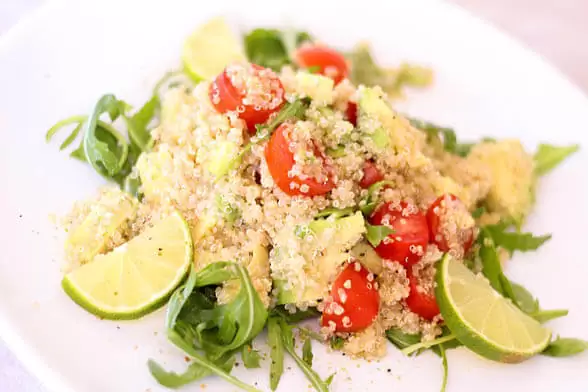
Quinoa is often mistaken as a grain, but it’s a seed plant. It looks a lot like couscous and can be eaten in the place of rice. It is a nutritious source of protein with extra minerals like iron, magnesium and very full of fiber. The dried fruits and seeds of this plant can be used as a food staple and ground into flour with which you can make cookies and muffins.
Proteins in cooked quinoa
4.5 g per 100 g
2-2.5 g per serving (1/2 cup)
2. Lentils

Lentils are edible, lens-shaped seeds with flattened pods originally from southwest Asia. They are fast becoming a favorite source of protein, especially for vegan diets and vegetarians. They have a high fiber content and contain just a cup more protein than three eggs. They are advised for people seeking to reduce their cholesterol levels and lose weight.
Proteins in lentils
18-26 grams per 100 g
17-25 g per serving (1/2 cup)
3. Green Peas

Apart from being an excellent source of protein, peas also contain amino acids that are essential to metabolisms and aid in weight loss. They are rich in vitamins, magnesium, and iron to mention a few.
Proteins in green peas
5 g per 100 g
8 g per serving (1 cup)
4. Nuts (Peanuts, Almonds, Cashew, Chestnuts, Macadamia, Pistachio)
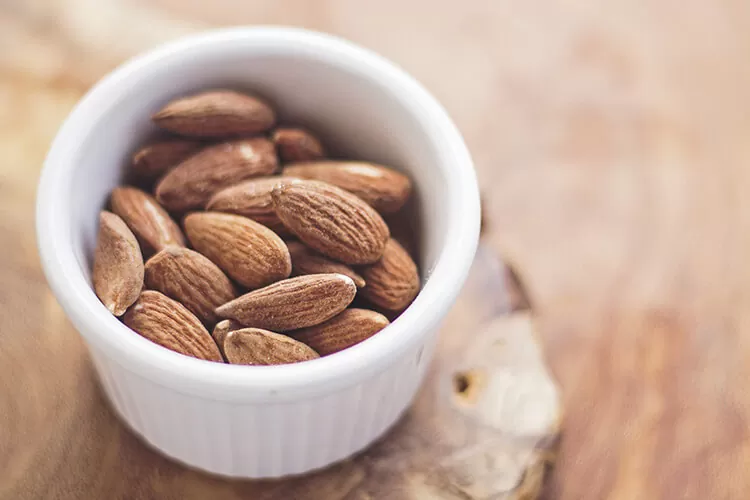
The nuts are a healthy source of protein with so many health benefits – they are a healthy snack and an energy booster. Cashews are rich in magnesium and help boost the immune system. Peanuts can prevent both cardiovascular and coronary artery disease — the most common type of heart condition and provide protein for muscle building. Butters from these nuts are also an excellent source of healthy fat.
Proteins in Almonds
19-22 g per 100 g
10-12 g per serving (1/3 cup)
Proteins in Cashewnuts
12-18 g per 100 g
5-6 g per serving (1/3 cup)
Proteins in Chestnut
3-6 g per 100 g
1.5-3 g per serving (1/3 cup)
Proteins in Hazelnuts
13-15 g per 100 g
6.5-7.5 g per serving (1/3 cup)
Proteins in Macadamia
8 g per 100 g
4 g per serving (1/3 cup)
Proteins in Pistacchio
21 g per 100 g
10 g per serving (1/3 cup)
5. Tofu and Tempeh

These are protein sources that originate from soybeans. Soybeans are a rich source of protein that is laden with amino acids that are essential for the body. Tofu is made from curdled soybean milk. Tempeh is made from partially-cooked fermented soybeans. They both can be used in a wide range of food recipes – especially Asian ones.
Proteins in tofu
8 g per 100 ml
9 grams per serving (1/3 of block)
Proteins in soy tempeh
19 g per 100 ml
22 grams per serving (1/3 of block)
6. Soy Milk (and other vegetable milk)

Soy milk is made from soybeans and contains a lot of minerals and vitamins. It is an excellent vegan substitute for cow’s milk and contains the same amount of proteins than regular milk. While soy milk contains the same amount of proteins as cow’s milk, the rice, oat and almond milk are low in proteins.
Proteins in soy milk
3.3 g per 100 ml
8 grams per serving (cup)
Proteins in rice milk
0.3 g per 100 ml
0.7 grams per serving (cup)
Proteins in oat milk
1 g per 100 ml
2.4 grams per serving (cup)
Proteins in almond milk
1 g per 100 ml
2.4 grams per serving (cup)
7. Oats (Oatmeal)
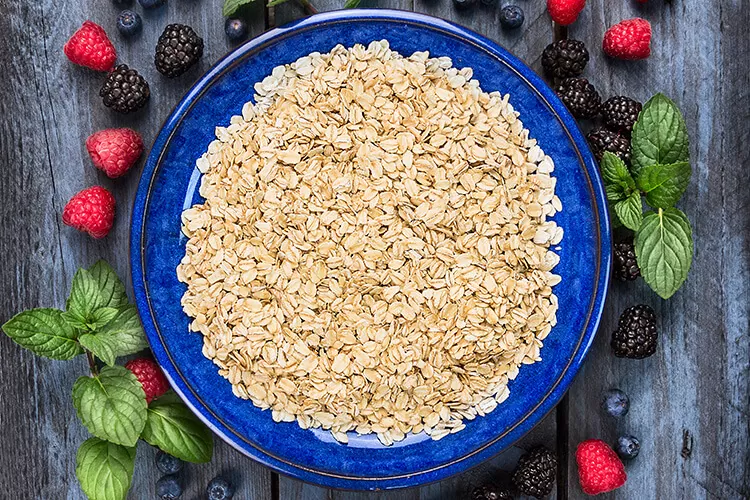
Oats are laden with rich fiber and have less starch in comparison to rice. They are a rich source of protein and also contain calcium, vitamin B, and magnesium.
Proteins in oatmeal
4 grams per 100 g
4 g per serving (1 cup, cooked in water)
8. Spirulina
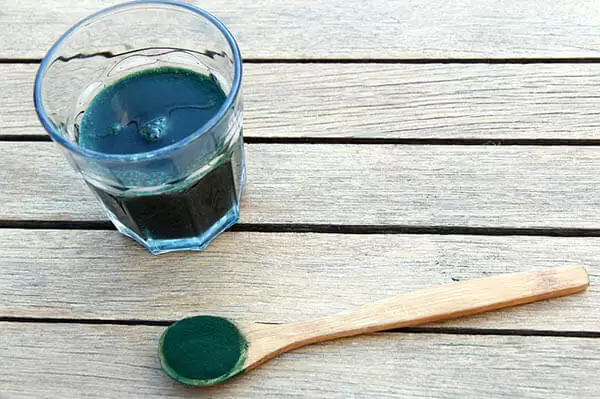
Spirulina is an algae that has numerous nutritional benefits. It contains a wide range of minerals including iron, riboflavin, magnesium, potassium, and thiamine. It is also an excellent source of protein and fatty acids. More than half of it is just pure vegan protein!
Proteins in spirulina
57 grams per 100 g
4 g per serving (1 Tablespoon)
9. Chia Seeds
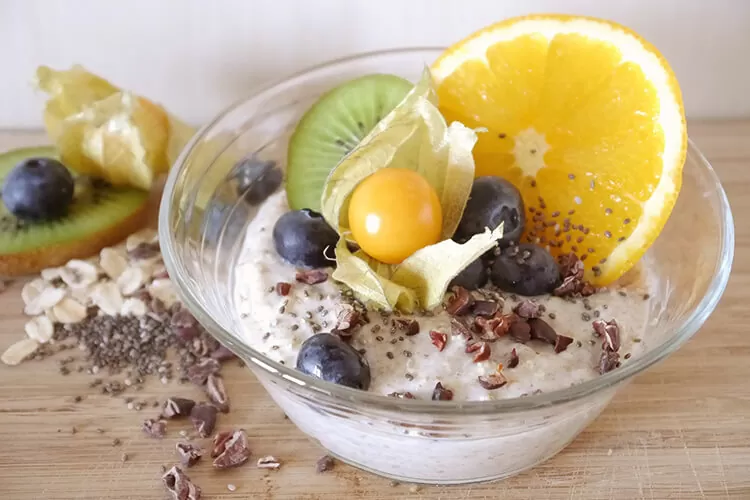
We already wrote about chia seeds as superfood and this amazing seeds are also extra reach in proteins.
Proteins in chia seeds
20 grams per 100 g
2.8 g per serving (1 Tablespoon)
10. Pumpkin Seeds
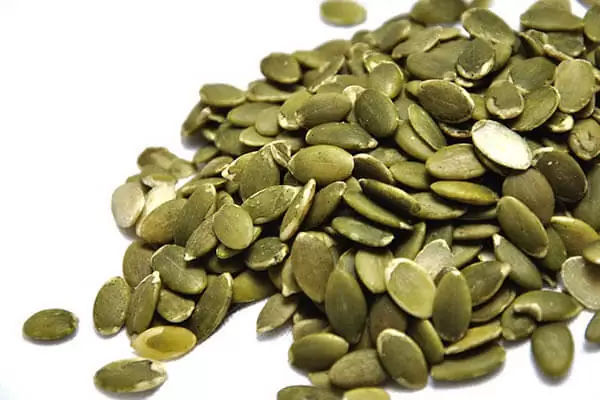
Pumpkin seeds are an underrated source of protein. They contain many good fats, zinc, manganese, copper and magnesium. You can eat them wiht or without the skin. And no, pumpkin seeds oil doesn’t contain proteins.
Proteins in whole pumkin seeds
18 g per 100 g
6 per serving (2 tablespoons)
Proteins in pumpkin seed kernels
29-30 g per 100 g
8 g per serving (2 tablespoons)